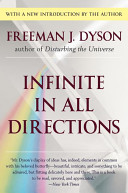Science Unifiers
Now it is generally true that the very greatest scientists in each discipline are unifiers. This is especially true in physics. Newton and Einstein were supreme as unifiers. The great triumphs of physics have been triumphs of unification. We almost take it for granted that the road of progress in physics will be a wider and wider unification bringing more and more phenomena within the scope of a few fundamental principles. Einstein was so confident of the correctness of this road of unification that at the end of his life he took almost no interest in the experimental discoveries which were then beginning to make the world of physics more complicated. It is difficult to find among physicists any serious voices in opposition to unification. One such voice is that of Emil Wiechert: "If we start from our human scale of existence and explore the content of the universe further and further, we finally arrive, both in the large and in the small, at misty distances where first our senses and then even our concepts fail us."
This remark of Wiechert's shows him to have been extraordinarily far-sighted. At the time when he was speaking, the leading theoretical physicists of Germany were still engaged in bitter arguments over the question of the real existence of atoms. Rutherford was then a young student newly arrived in England from New Zealand, only just started on the road that would lead him to the discovery of alpha-particles and atomic nuclei. More than half a century was to pass by before the flowering of experimental particle physics, which would reveal a whole new world of strange objects and strange interactions hidden within structures that are themselves far smaller than atoms. Wiechert's words were ignored. His vision was too large for the time he lived in.
In biology the roles are reversed. A very few of the greatest {46} biologists are unifiers. Darwin was a unifier, consciously seeing himself as achieving for biology the unification which Newton had achieved for physics. Darwin succeeded in encompassing the entire organic world within his theory of evolution. But the organic world remains fundamentally diverse. Diversity is the essence of life, and the essential achievement of Darwin's theory was to give intellectual coherence to that diversity. The working lives of ninety-nine out of a hundred biologists are spent in exploring the details of life's diversity, disentangling the complex behavior patterns of particular species or the marvelously intricate architecture of particular biochemical pathways. Biology is the natural domain of diversifiers as physics is the domain of unifiers. Unifiers like Darwin are as rare in biology as diversifiers like Wiechert are rare in physics. Darwin had no peer and no successor.
Or perhaps I should say, Darwin has only one successor and his name is Francis Crick. In saying this, I am not expressing a judgment of the greatness of Crick as compared with other contemporary biologists, and still less am I expressing a judgment of the importance of molecular biology as compared with botany and zoology. I am merely saying, Crick is a unifier of biology in the style and tradition of Darwin.
Ninety-eight years after Darwin published his Origin of Species, Crick propounded and named the Central Dogma of molecular biology:
"The Central Dogma. This states that once information has passed into protein it cannot get out again. In more detail, the transfer of information from nucleic acid to nucleic acid, or from nucleic acid to protein may be possible, but transfer from protein to protein, or from protein to nucleic acid is impossible."
The propounding of dogmas is an unusual activity for a biologist. Even Crick does not spend much of his time propounding dogmas. He spends most of his time studying the details of particular structures, just as Darwin spent much of his time studying details of the taxonomy of barnacles. But at heart Crick is a unifier, and in the end he will be remembered {47} as the man who stated in simple words the unifying principle of biology for the twentieth century, as Darwin did for the nineteenth.
Notes:
Folksonomies: science unification
Taxonomies:
/science/physics (0.507359)
/science/biology (0.442053)
/religion and spirituality (0.276374)
Keywords:
nucleic acid (0.962067 (negative:-0.304160)), Darwin (0.912950 (positive:0.139307)), organic world (0.765323 (positive:0.520975)), experimental particle physics (0.752719 (neutral:0.000000)), marvelously intricate architecture (0.738280 (positive:0.297580)), Central Dogma (0.732926 (negative:-0.262378)), molecular biology (0.732036 (neutral:0.000000)), particular biochemical pathways (0.728597 (positive:0.297580)), entire organic world (0.727711 (positive:0.377658)), Crick (0.679102 (negative:-0.435695)), Emil Wiechert (0.678493 (neutral:0.000000)), Francis Crick (0.670526 (neutral:0.000000)), heart Crick (0.667713 (neutral:0.000000)), wider unification (0.658400 (positive:0.441036)), great triumphs (0.628504 (positive:0.873857)), unifiers (0.624593 (positive:0.425558)), Science Unifiers (0.622088 (positive:0.466020)), greatest scientists (0.610061 (positive:0.466020)), human scale (0.601097 (neutral:0.000000)), misty distances (0.601076 (negative:-0.648128)), fundamental principles (0.598802 (positive:0.441036)), young student (0.596795 (neutral:0.000000)), experimental discoveries (0.593756 (positive:0.476989)), bitter arguments (0.593755 (negative:-0.247879)), atomic nuclei (0.592924 (neutral:0.000000)), intellectual coherence (0.592093 (positive:0.627701)), real existence (0.592082 (negative:-0.247879)), theoretical physicists (0.591713 (negative:-0.247879)), contemporary biologists (0.591215 (neutral:0.000000)), New Zealand (0.590658 (neutral:0.000000))
Entities:
Darwin:OperatingSystem (0.873486 (positive:0.314023)), Emil Wiechert:Person (0.562899 (positive:0.205152)), molecular biology:FieldTerminology (0.510638 (positive:0.219158)), Francis Crick:Person (0.412748 (negative:-0.377226)), heart Crick:GeographicFeature (0.292086 (neutral:0.000000)), Einstein:Person (0.255558 (positive:0.465932)), Newton:Person (0.248196 (positive:0.369208)), Rutherford:Person (0.192872 (neutral:0.000000)), theory of evolution:FieldTerminology (0.185784 (positive:0.377658)), Germany:Country (0.181650 (negative:-0.247879)), New Zealand:Country (0.179440 (neutral:0.000000)), England:Country (0.167738 (neutral:0.000000)), Ninety-eight years:Quantity (0.167738 (neutral:0.000000))
Concepts:
Evolution (0.969618): dbpedia | freebase | opencyc
DNA (0.910600): website | dbpedia | freebase | yago
Molecular biology (0.824099): dbpedia | freebase | opencyc
Biology (0.652102): dbpedia | freebase | opencyc
Physics (0.629769): dbpedia | freebase | opencyc
Charles Darwin (0.611383): dbpedia | freebase | opencyc | yago
Francis Crick (0.605949): dbpedia | freebase | yago
Quantum mechanics (0.580238): dbpedia | freebase | opencyc





